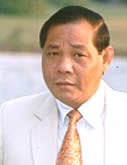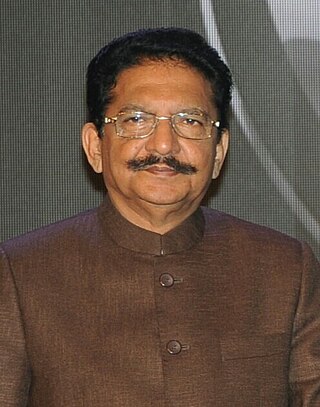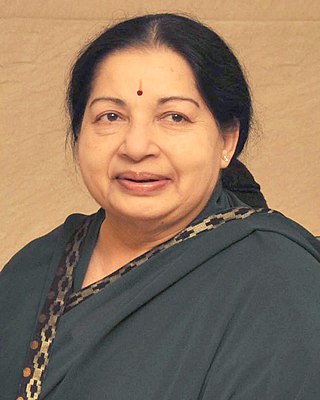
The prime minister of India is the head of government of the Republic of India. Executive authority is vested in the prime minister and his chosen Council of Ministers,despite the president of India being the nominal head of the executive. The prime minister has to be a member of one of the houses of bicameral Parliament of India,alongside heading the respective house. The prime minister and their cabinet are at all times responsible to the Lok Sabha.

Purno Agitok Sangma was an Indian politician who has served as the 4th Chief Minister of Meghalaya from 1988 to 1990 and the 11th Speaker of the Lok Sabha from 1996 to 1998. He also served as a member of the Lok Sabha from Tura from 2014 to 2016,1991 to 2008 and from 1977 to 1989 and the minister of 21st Information and Broadcasting in the Rao ministry from 1995 to 1996,founder of NPP and Co- founder of NCP. He was the candidate for the 2012 Indian presidential election,supported by BJP and AIADMK,however he lost to Congress politician Shri Pranab Mukherjee. He was awarded the Padma Vibhushan,India's second highest civilian award,posthumously in 2017 in the field of Public Affairs and was the first recipient of Padma Vibhushan from Meghalaya.

Shankarrao Bhavrao Chavan was an Indian politician who served as the chief minister of Maharashtra twice from 1975 until 1977 and from 13 March 1986 until 26 June 1988. He was the finance minister of India from 1988 to 1989 in Rajiv Gandhi ministry. He also served as the home minister of India twice,from 31 December 1984 to 12 March 1986 in the Rajiv Gandhi cabinet,and from 21 June 1991 to 16 May 1996 in the P. V. Narasimha Rao cabinet.

Neelam Sanjiva Reddy was an Indian politician who served as the sixth president of India,serving from 1977 to 1982. Beginning a long political career with the Indian National Congress Party in the independence movement,he went on to hold several key offices in independent India –as Deputy Chief minister of Andhra state and the first chief minister of Andhra Pradesh,a two-time Speaker of the Lok Sabha and a Union Minister—before becoming the Indian president.

Madhavrao Jivajirao Scindia was an Indian politician and a minister in the Government of India. He was a member of the Indian National Congress party.

Sitaram Kesri was an Indian politician and parliamentarian. He became a union minister and served as President of the Indian National Congress from 1996 to 1998.

Paramasivan Subbarayan was an Indian politician,freedom fighter and diplomat and was the First Minister of Madras Presidency,India's ambassador to Indonesia and Union Minister of Transport and Communications in Jawaharlal Nehru's government. He was the father of General P. P. Kumaramangalam,who served as India's Chief of Army staff,and of politician Mohan Kumaramangalam. He was also the grandfather of INC and BJP politician and Union Minister Rangarajan Kumaramangalam.

Vidya Charan Shukla was an Indian politician whose political career spanned six decades. He was predominantly a member of the Indian National Congress,but also had spells in Jan Morcha,Janata Dal,Samajwadi Janata Party (Rashtriya),Nationalist Congress Party and Bharatiya Janata Party. He was known as a close associate of Indira Gandhi.

General elections were held in India on 20 May,12 June and 15 June 1991 to elect the members of the 10th Lok Sabha,although they were delayed until 19 February 1992 in Punjab.

Chennamaneni Vidyasagar Rao is an Indian politician from Telangana,associated with Bharatiya Janata Party. He served as Governor of Maharashtra from 2014 to 2019. As a member of the Bharatiya Janata Party,he had served as a Union Minister of State in the Ministry of Home Affairs in Atal Bihari Vajpayee's government from 1999. He was elected to the Lok Sabha in 1998 and 1999 from Karimnagar.
Jitendra Prasada was an Indian politician and a former vice-president of the Indian National Congress. He was also the political advisor to two prime ministers of India,Rajiv Gandhi in 1991 and P. V. Narasimha Rao in 1994.
Lalitha Kumaramangalam is an Indian politician who is a member of the Bharatiya Janata Party (BJP) and former chairperson of the National Commission for Women. She was previously the National Secretary of the Bharatiya Janata Party (BJP).

The 1998 Indian general election polls in Tamil Nadu were held for 39 seats in the state. New elections were called when Indian National Congress (INC) left the United Front government led by I. K. Gujral,after they refused to drop the regional Dravida Munnetra Kazhagam (DMK) party from the government after the DMK was linked by an investigative panel to Sri Lankan separatists blamed for the killing of Rajiv Gandhi. The result was a landslide victory for the National Democratic Alliance (NDA) winning 30 seats,which helped result in Atal Bihari Vajpayee being sworn in as the 16th Prime Minister of India. J. Jayalalithaa and the All India Anna Dravida Munnetra Kazhagam,broke off from their long alliance with Indian National Congress and formed an alliance with Bharatiya Janata Party,by joining the National Democratic Alliance. This state proved to be very important in determining the prime minister,since the 18 seats of AIADMK proved valuable for BJP to hold power. That was short-lived,since the AIADMK left the alliance in less than a year,and BJP lost the vote of confidence resulting in fresh elections being called.
Surendra Mohan Kumaramangalam was an Indian politician and communist theorist who was a member of the Communist Party of India,and later,the Indian National Congress. He also served as Advocate-General for Madras State from 1966 to 1967. Kumaramangalam was killed in the crash of Indian Airlines Flight 440 on May 31,1973,at the age of 56.
Tella Lakshmi Kantamma was an influential Indian politician who served as a member of parliament from 1962 to 1977. She was also a political advisor to Prime Minister P.V Narasimha Rao.

Kudmul Ranga Rao was a social reformer from Kudmul,a village in the erstwhile Madras Presidency,who established "Depressed Classes Mission" in 1897 in Mangalore for providing education,better housing,drinking water and empowering the backward classes socially by guarding them against exploitation by other classes.
Kumaramangalam estate is a Zamindari Gounder estate in the Salem and Namakkal districts of Tamil Nadu,India. The estate included vast lands in the Omalur and Sankagiri taluks of Salem district and the Thiruchengode taluk of Namakkal district. The most well known among the zamindars was P. Subbarayan who served as Chief Minister of the Madras Presidency from 1926 to 1930. His son,Mohan Kumaramangalam,daughter Parvathi Krishnan and grandson Rangarajan Kumaramangalam have all served as members of the upper house of the Indian Parliament the Lok Sabha. Subbarayan's oldest son P. P. Kumaramangalam was a former chief of army staff.
The list of political families of Tamil Nadu state in India.

The Leader of the House in Lok Sabha is the parliamentary chairperson of the party that holds a majority in the Lok Sabha and is responsible for government business in the house. The office holder is usually the prime minister if they are a member of the house. If the prime minister is not a member of the Lok Sabha,usually the senior-most minister in the union cabinet serves as the leader of the house.












